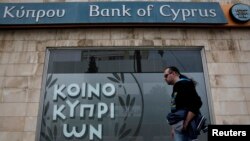MOSCOW —
The Russian government will not aid businesses that have lost money in Cyprus, First Deputy Prime Minister Igor Shuvalov said, underscoring Moscow's resolve to clamp down on the flight of capital to offshore financial centers.
Major account holders, many of them Russian, will lose up to 60 percent of their deposits over 100,000 euros ($128,400) at Cyprus's largest bank under a European Union bailout to save the Mediterranean island from bankrutpcy.
If Russians lose money "it's a terrible shame, but the Russian government will not take any action in such a situation," Shuvalov was quoted by the Interfax news agency as saying in a television interview on Sunday night.
But if a large company, in which the Russian state was a shareholder, sustained serious losses then this could be reviewed on a case-by-case basis, Shuvalov added.
"If there is some kind of concrete situation, we would be willing to examine it - publicly, transparently, here in Russia, but for this it would not be necessary to assist Cyprus," he said.
Cyprus is a staging post for large-scale capital flows in and out of Russia - including around a quarter of foreign direct investment flows and foreign lending, according to investment bank Morgan Stanley.
Much of that money is taking advantage of favorable tax treatment, but some is seeking to evade the Russian tax authorities, Shuvalov said.
Russians were believed to account for most of the 19 billion euros of non-EU, non-bank money held in Cypriot banks in January, according to the island's central bank. Of 38 billion euros in deposits from banks, 13 billion euros came from outside the EU.
($1 = 0.7788 euros)
Major account holders, many of them Russian, will lose up to 60 percent of their deposits over 100,000 euros ($128,400) at Cyprus's largest bank under a European Union bailout to save the Mediterranean island from bankrutpcy.
If Russians lose money "it's a terrible shame, but the Russian government will not take any action in such a situation," Shuvalov was quoted by the Interfax news agency as saying in a television interview on Sunday night.
But if a large company, in which the Russian state was a shareholder, sustained serious losses then this could be reviewed on a case-by-case basis, Shuvalov added.
"If there is some kind of concrete situation, we would be willing to examine it - publicly, transparently, here in Russia, but for this it would not be necessary to assist Cyprus," he said.
Cyprus is a staging post for large-scale capital flows in and out of Russia - including around a quarter of foreign direct investment flows and foreign lending, according to investment bank Morgan Stanley.
Much of that money is taking advantage of favorable tax treatment, but some is seeking to evade the Russian tax authorities, Shuvalov said.
Russians were believed to account for most of the 19 billion euros of non-EU, non-bank money held in Cypriot banks in January, according to the island's central bank. Of 38 billion euros in deposits from banks, 13 billion euros came from outside the EU.
($1 = 0.7788 euros)











